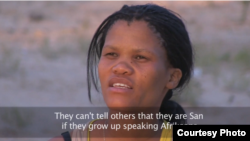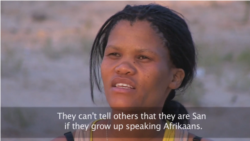A Zimbabwean based in South Africa is curving a niche in the film industry and has just made a big leap into the lucrative business after directing a documentary that will be premiered this month in New York, USA.
Davison Mudzingwa of Mvura Ya Afrika Productions directed Lost Tongue, a documentary that explores the revival of the ancient and endangered Nluu language of the Khomani San people in the Kalahari Desert.
The documentary captures the journey of a Khomani San woman, Helena Steenkamp, who is determined to restore and revive her disappearing language and culture.
Mudzingwa sad the documentary will be premiered as a surprise package at the Socially Relevant Film Festival in New York.
“In the U.S from the 14th to the 21st there is a film festival called Socially Relevant Film Festival in New York and our film, we are fortunate to have been selected, to screen at the prestigious festival and this film is called Lost Tongue. It will be screened on the 17th of March in New York.”
He said the film is based on Steenkamp, who is seeking to restore and revive her language and culture. “We followed her for about three years filming her efforts to revive or to retain her language which is called Nluu. It is one of the most ancient languages in the world and for those that have done research about it they say it’s about 25,000 years old.
“So, the problem with this language is that only three elders, and the youngest of these elders is 80 years old, can speak the language fluently. Helena’s efforts have been to ensure that the language does not die … It doesn’t disappear with these elders who are still surviving.”
He said when they followed her for three years other thematic areas emerged like culture and preservation of identity. “All these issues had to be answered in the documentary. They became universal themes because a lot of countries are facing similar problems.
“If you check in different countries in the SADC (Southern African Development Community) in Zimbabwe we have also have the San people in Tsholotsho and we also the Tonga people in Binga they are also facing the same problem of a language that is disappearing.”
He noted that “a language does not disappear on its own it goes with the values, it goes with the culture and it goes with the identity.”
Mudzingwa said the main objective of the documentary is to protect these important norms.







